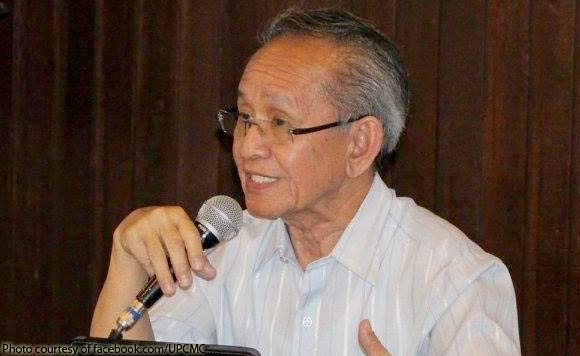Vantage Point by Luis V. Teodoro, December 11, 2020
Whenever President Rodrigo Duterte’s military and police minions or he himself “red-tags”— or, as it was known in the 1950s, red-baits — a women’s organization, a journalists’ union or any other group that dares criticize the regime, they inevitably label it a “legal front” of the Communist Party of the Philippines (CPP) and/ or the New People’s Army (NPA).
But by describing the supposed “fronts” as legal, they unwittingly admit that these groups have met the requirements of Philippine law in terms of registration and other conditions. What is even more crucial is that their status as legitimate organizations is protected by such provisions of the Constitution as those on the right to free expression, freedom of association, and press freedom,
Equally problematic is the concept of their being “fronts.” Does that mean that they are under the command of the CPP, and that, like the NPA, they foment rebellion, or are actually in rebellion themselves?
The regime has not outrightly accused these and the other groups it has labeled “red” of rebellion and of urging others to join the NPA so they too can take up the gun. But it is nevertheless still accusing them of conspiring with it. If what the government is saying is that these groups are “red” because their programs are the same, or nearly the same as those of the CPP and NPA, it does not prove even if true that they are under their command.
Any group can have the same advocacy as others without being part of any terrorist cabal or conspiracy. Gender equality, for instance, is not uniquely the advocacy of the women’s groups in this country, and is shared by countless organizations worldwide. As any scan of the codes of ethics of the press of many countries will reveal, the principle of truth-telling to which the biggest journalists’ organization in the Philippines subscribes is shared by hundreds of media communities and thousands of media practitioners across the planet.
If the basis of the claim that what makes these and other legal groups “fronts” is their being critical of government and their focus on getting at and reporting the truth, that is hardly a tenable argument. It instead raises the question of whether, in the first place, the Duterte regime can present evidence rather than hearsay or the say-so of its paid informers to prove its contention. Although they have failed to do so, the police and military nevertheless still persist in red-baiting them, implying thereby that it is their programs’ similarity to those of the CPP and its allied organizations that make them “enemies of the State.”
But the legal groups they’re demonizing are perfectly within their rights to propagate their advocacies. No law bars any one or any organization from doing so. By protecting their right to present and speak for what they believe in, and to convince others to share those beliefs, the Constitution is on the contrary encouraging them to exercise those rights.
Regime antipathy to those rights drives its use of the 1950s practice of red-baiting. It is to intimidate critics into silence. But some of its adherents would go even farther by reviving the Anti-Subversion Law (RA 1700), which when in force made not only membership in the Communist Party but also holding views and proposing reform programs similar to its own illegal.
Former President and Duterte ally Gloria Macapagal- Arroyo’s favorite general’s proposal to revive it was echoed in 2019 by Department of the Interior and Local Governments (DILG) Secretary Eduardo Ano. But he included in his justification for its reenactment the claim that not only the CPP and the NPA but also their “front organizations” have been using force and violence as well as “deceit, propaganda and other illegal means” to overthrow the government.
One can only conclude from his statements that if reenacted, a 21st century versions of the Anti-Subversion Act would criminalize “deceit, propaganda and other illegal means,” which Ferdinand Marcos included among his amendments to the original RA 1700 when he endowed himself with legislative powers during the martial law years.
Such a reprise of an even more oppressive law than the 1957 original, as in the time of the Marcos dictatorship, would define deceit and propaganda as anything contrary to what the government says. It would be in contravention of the Constitutional provision protecting free expression and press freedom, the exercise of either right being quite easily defined by those in power as deceit and propaganda, neither of which is currently illegal.
(One can argue that it is government that is most involved in both, as its own media system’s masters of disinformation have been amply demonstrating. But no one in his right mind would argue for the prosecution of those overpaid bureaucrats. The Constitution after all recognizes everyone’s right to free expression, including that of government functionaries.)
Justice Secretary Menardo Guevarra and Senator Franklin Drilon opposed the proposal, with Guevarra pointing out that membership in the CPP is not illegal so long as it is limited to the espousal of its programs. Drilon for his part noted the legal infirmities of RA 1700, which, he said, included its abridging the freedoms of assembly and association and the equal protection clause of the Constitution.
RA 1700 was in fact described by its critics as a bill of attainder because it punished without trial, and as an ex-post facto law that made acts that were not contrary to law before it was passed illegal. But Congress repealed it at the urging of then President Fidel Ramos in 1992 for an even more compelling reason: the imperative of broadening participation in government so as to minimize if not totally put an end to the rebellions that have characterized much of Philippine history.
A former Deputy Chief of Staff of the Armed Forces of the Philippines (AFP) and Secretary of National Defense during the Corazon Aquino presidency, Mr. Ramos described the repeal as a means of convincing reformers and revolutionaries to participate in government rather than to take up arms. He correctly assumed that one of the causes of rebellions is the refusal of government to allow such groups the opportunity to make their programs heard, and if plausible, to have them adopted through parliamentary means. He was in that regard far more astute than his fellow generals, who today make it appear that people take up arms simply out of malice. Mr. Ramos also implicitly recognized that underdevelopment, poverty, injustice, and the many other ills Filipino flesh is heir to are the causes of rebellion rather than rebellion’s being their cause. That indisputable fact helps explain why, during the 35 years that it was in force, RA 1700 failed to prevent the armed conflicts that have persisted in this country for decades.
Only the severely intellectually challenged would fail to conclude from the evidence available that penalizing people for their political beliefs and red-baiting, harassing and threatening government critics will not end rebellions. What will is democratizing governance so that the economic and social inequities that condemn millions to the horrors of poverty and injustice and to short brutish lives can be effectively addressed. Unfortunately, the last time an administration actually believed that was 28 years ago. What is instead happening today is a replication of the bad old days of the 1950s, in another demonstration of the gross incapacity of this country’s power elite to learn from the past.
Also published in BusinessWorld. Photo from Rody Duterte Facebook Page.




